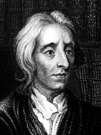Although he completed a
philosophical education at Oxford, John Locke declined the offer of a permanent academic position in order to avoid committing himself to a religious order. Having also studied medicine, he served for many years as private physician and secretary to Anthony Ashley Cooper, the first Earl of Shaftesbury and one of the Lord Proprietors of the Carolina Colonies. Locke's involvement with this controversial political figure led to a period of self-imposed exile in Holland during the 1680s, but after the Glorious Revolution of 1688 he held several minor governmental offices. A friend of Isaac Newton and Robert Boyle, Locke was also an early member of the Royal Society. He studied and wrote on philosophical, scientific, and political matters throughout his life, in a voluminous correspondence and ample journals, but the public works for which he is best known were published in a single, sudden burst.
The fundamental principles of Locke's philosophy are presented in An Essay Concerning Human Understanding (1690), the culmination of twenty years of reflection on the origins of human knowledge. According to Locke, what we know is always properly understood as the relation between ideas, and he devoted much of the Essay to an extended argument that all of our ideas—simple or complex—are ultimately derived from experience. The consequence of this empiricist approach is that the knowledge of which we are capable is severely limited in its scope and certainty.Our knowledge of material substances, for example, depends heavily on the secondary qualities by reference to which we name them, while their real inner natures derive from the primary qualities of their insensible parts.
Nevertheless, Locke held that we have no grounds for complaint about the limitations of our knowledge, since a proper application of our cognitive capacities is enough to guide our action in the practical conduct of life. The Essay brought great fame, and Locke spent much of the rest of his life responding to admirers and critics by making revisions in later editions of the book, including detailed accounts of human volition and moral freedom, the personal identity on which our responsibility as moral agents depends, and the dangers of religious enthusiasm. One additional section that was never included in the Essay itself is Of the Conduct of the Understanding, a practical guide to the achievement of useful beliefs about the world.The bachelor philosopher's notions about childrearing appeared in Some Thoughts concerning Education (1693).
By contrast, Locke chose to avoid controversy by publishing his political writings anonymously. With the Two Treatises of Civil Government (1690) Locke established himself as a political theorist of the highest order. The First Treatise is a detailed refutation of the (now-forgotten) monarchist theories of Robert Filmer, but the Second Treatise of Government offers a systematic account of the foundations of political obligation. On Locke's view, all rights begin in the individual property interest created by an investment of labor. The social structure or commonwealth, then, depends for its formation and maintenance on the express consent of those who are governed by its political powers. Majority rule thus becomes the cornerstone of all political order, and dissatisfied citizens reserve a lasting right to revolution. Similarly, Locke's Letter Concerning Toleration (1689) argued for a broad (though not limitless) acceptance of alternative religious convictions.
دوست عزیز، به سایت علمی نخبگان جوان خوش آمدید
مشاهده این پیام به این معنی است که شما در سایت عضو نیستید، لطفا در صورت تمایل جهت عضویت در سایت علمی نخبگان جوان اینجا کلیک کنید.
توجه داشته باشید، در صورتی که عضو سایت نباشید نمی توانید از تمامی امکانات و خدمات سایت استفاده کنید.



.gif)


 پاسخ با نقل قول
پاسخ با نقل قول


علاقه مندی ها (Bookmarks)